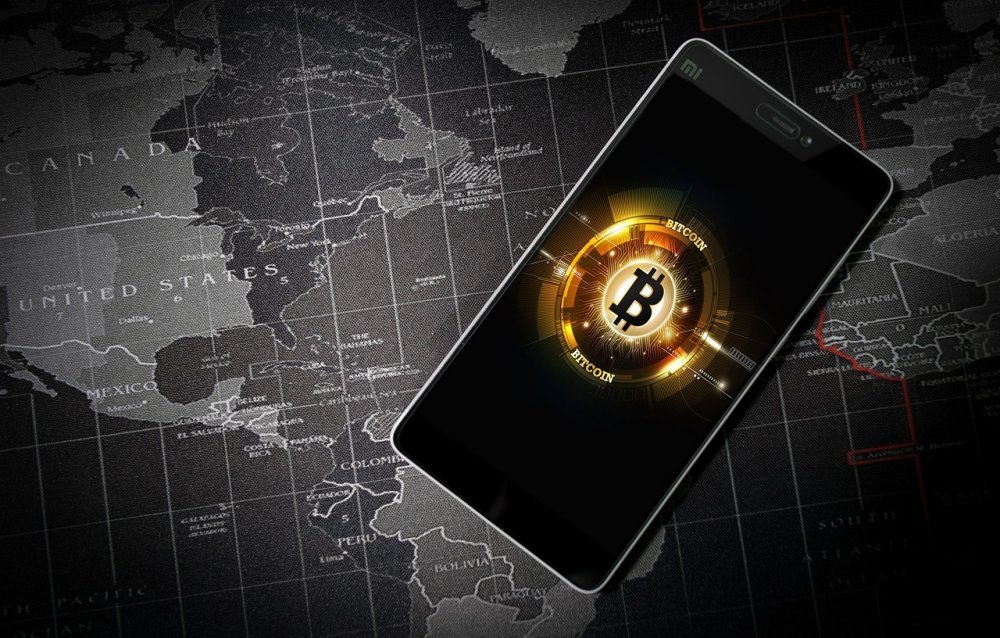Introduction
When most people want to get a hold of cryptocurrencies or exchange one digital asset for another, Coinbase and Kraken are often some of the marketplaces to get this done. These two centralized Exchanges are among the oldest players in the crypto game -- Kraken entered the crypto market in 2011 while Coinbase began its services in 2012.
For sure, since they different companies, it is an obvious expectation that the experience is as well unique. What you get at Coinbase, you will probably not find it at Kraken. This review explores the key differences between the two Exchanges.
Without wasting any more time, let's get started with our comparison. But first, this is what the review covers:
Kraken Vs. Coinbase: Key Comparisons
|
Exchange |
Kraken |
Coinbase |
|
Site Type |
Cryptocurrency Exchange |
Cryptocurrency retail shop |
|
Site reputation |
Above Average (4.0 stars) |
Above average (4.0 stars) |
|
User-friendliness of the site |
Not beginner-friendly |
Beginner friendly |
|
Start-up year |
2011 |
2012 |
|
Data and funds security |
Tight Security measures |
Above standard Security measures. |
|
Headquarters location |
San Francisco |
San Francisco |
|
Buying & methods |
Bank (Swift, SEPA, etc) Crypto |
Bank (ACH), Wire transfer, and Debit cards |
|
Fees |
Low |
Slightly high |
|
Purchase limit |
$25/day ACH |
|
|
Verification requirements |
A must |
Yes for level 2 accounts. |
|
Customer support rating |
Average rating |
Below average |
|
Trading Vol in BTC (last 6 months) |
$2M in BTC (Aug 2018 - Jan 2019). |
Around $2M. |
|
Review Guide |
- |
|
|
Visit site |
Kraken |
Company overview
Coinbase:
Coinbase started small but it has grown into a giant-sized company offering jobs to approximately 800 employees as of late 2018. The cryptocurrency Exchange was co-founded by Brian Armstrong and Fred Ehrsa back in 2012. The private, independent company is based in San Francisco, California; it has an estimated annual revenue of $139.6M. In terms of value, the company was valued at $8 billion, following a funding of $300M in last quarter of 2018. So far, Coinbase has acquired about eight companies, Gryfly, Inc being the most-recent acquisition that occured mid January 2019.
You may think not so many people are into Coinbase but check this out: on Twitter, it has 237.k followers, and on Facebook, it has following of 178.8K fans – clearly numbers don’t lie. Historically, it has raised about $538.5M.
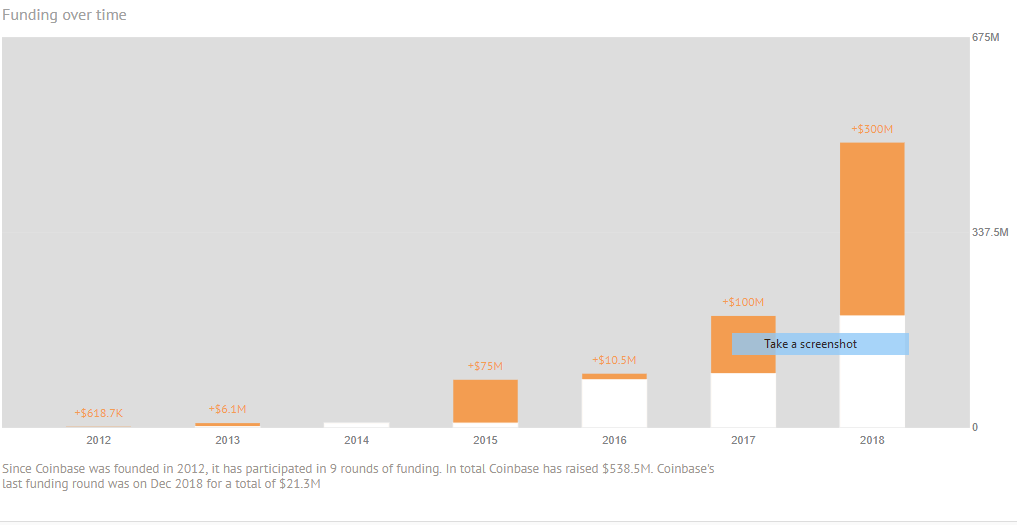
Screenshot showing Coinbase funding since launch. Source: Owler.com
Kraken:
Kraken is also based in San Francisco, California. In comparison to Coinbase, it has an estimated annual revenue of $3.1M, and historically, it has only received a funding of $5M in total. On Facebook, Kraken has around 64.7K followers and 13.8K fans on twitter as of January 2019. Jesse Powell is the CEO.
When he launched the private business in 2011, a huge volume of bitcoin markets were depending on a single Exchange, Mt. Gox. Mt. Gox was covering about 70 percent of all bitcoin trades. Following poor management of Mt.Gox where Jesse was among the entrepreneurs helping Mt.Gox recover from the “heist of the century’’. Tracing the missing coins and assisting with investigations. When Kraken beta version was later launched in 2013, it was simply an alternative to Mt.Gox.
Now, Kraken is among the leading cryptocurrency Exchanges with trading volume of $74, 685, 620 USD as of 28th January 2019 – this is equivalent to 21, 854 worth of BTC. See the 24 hours trading volume different pairs in the screenshot below.
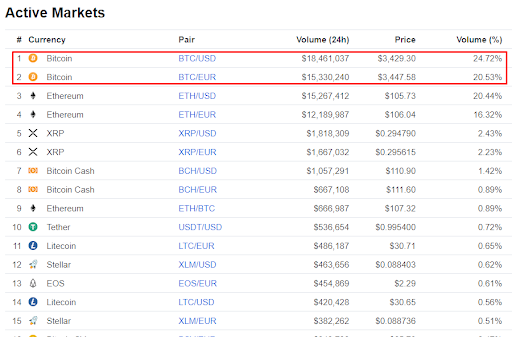
How friendly is the website to users?
Kraken:
Kraken recently updated their trading platform to Beta version, an approach that was aimed at resolving bugs that were causing traders to lose money. The new trading engine features two trading interfaces: there is a simple interface for ordinary buy and sell transactions, and there is the advanced interface with features for the experienced trader. If you are getting started in crypto, the simple interface will be easy to crack; but we cannot say the same about the advanced interface. You may need to play around with the interface to get acquainted with the trading platform.
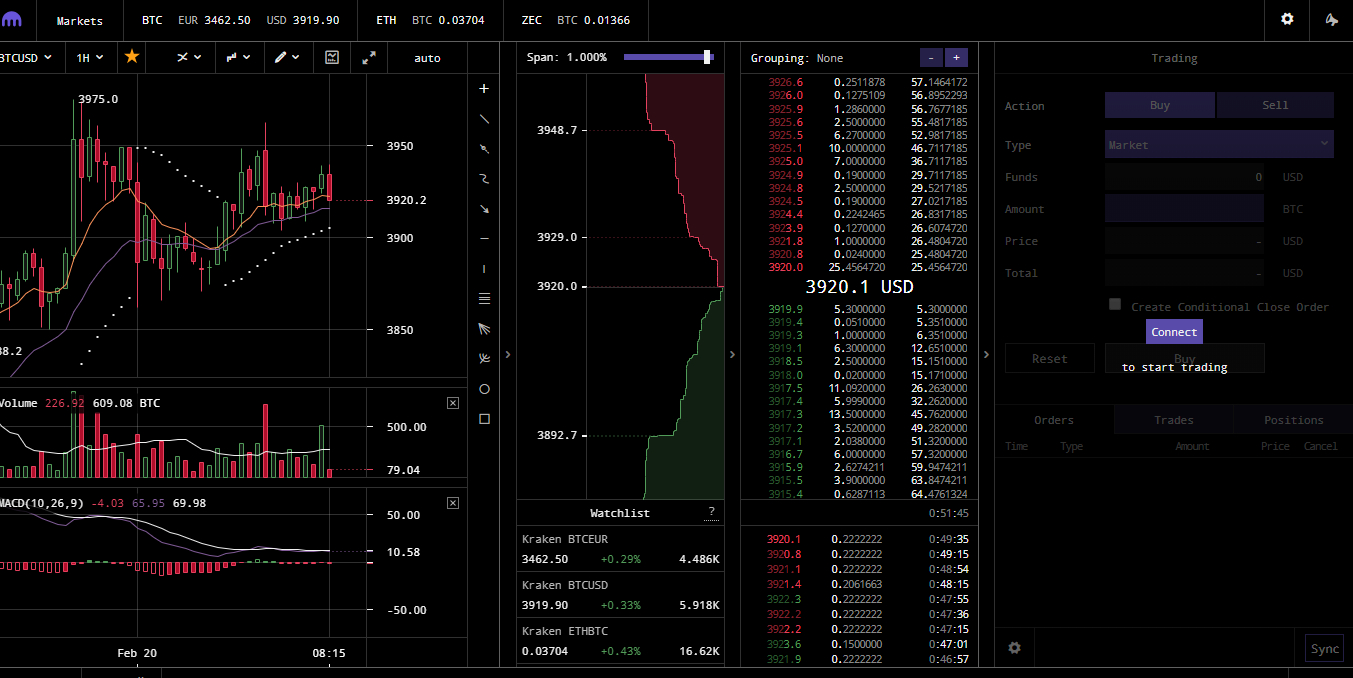
Coinbase:
As for Coinbase, the website is pretty straightforward. Even if you are new to the platform, you will not have a hard time trying to navigate around, like Kraken’s platform. Due to simplicity and website friendliness, many new users are likely opt for Coinbase when just starting out. Otherwise, if you are a more experienced trader, you are more likely to choose Kraken.
Customer Reputation
Kraken
Since its has been in operation, Kraken’s credibility has been tested to the limit. While the company has tried to maintain a clean track record, it has not been a smooth sail either – some hiccups here and there, indeed. Traders who have opted to use Kraken like the Exchange because of several reasons: the low fees, strong security measure, it is open to all, and it provides traders with option to trade in crypto and fiat currencies.
Nonetheless, like any most centralized exchanges, not everyone seems to have a pleasant experience. But that is expected because in crypto, even these Exchanges are operating in murky waters. For most complaints, the issue was support being slow at times, limiting of users’ funds, delaying/suspending withdrawals. Some customers also say Kraken has been censoring customer complaint on social forums like Reddit or providing canned responses to every query.
Also, many users report that the trading interface needs some work – a lot of bugs are causing customers to lose funds. A trader took to Reddit, saying he lost over $40k due to unresolved bug in Kraken. Yet another user says he lost over 3 BTC when Kraken went down for over 40 hours.
Please note: the experience is different for every user.
Coinbase
When it comes to Coinbase, it is same sad story. Coinbase is caught in the same issues just like Kraken. There are delays in deposits and withdrawals, long verification wait-time, freezing of accounts, monitoring accounts, and holding users’ deposits. A gazillion of the complaints are centred on Coinbase customer support and account closure. Dealing with the customer care is an uphill experience - the team at Coinbase is not only slow and unhelpful but it is notorious for responding to customers with canned responses, like Kraken.
Nonetheless, not everyone seems to have been caught with the above issues. For some traders, it worked for them, and even though some hiccups may have occurred, it is was probably a minor issue. Not to say some people have not had a smooth sail, but there just too many negative reviews on Coinbase.
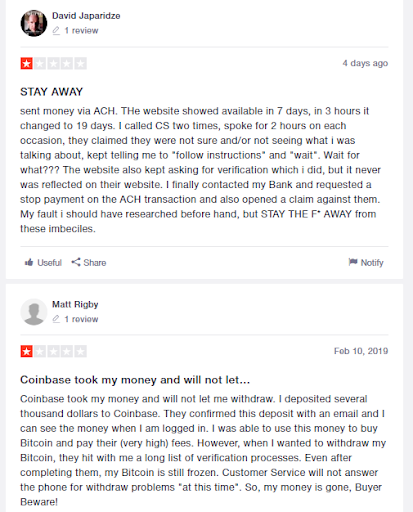
Comparing Kraken vs. Coinbase, Kraken has outranked Coinbase when it comes to Customer reputation in the industry.
Privacy and Security
Now, we roll down to the privacy and security issue: both Kraken and Coinbase have made a lot of effort to ensure security. Let’s look at some of the security steps undertaken by each Exchange.
Coinbase Security
Coinbase has not suffered major security breach in the past like the case for Mt.Gox or Cryptopia. However, many people have lost funds through account hacking. Such happens when customers’ account get hijacked by a fraudster through tactics such as phishing. Even so, Coinbase have tried their best to shield off attackers. Here are the security measures they undertake:
- Coinbase stores 98% customer funds in offline vaults and safe deposit boxes distributed in different locations around the world.
- Coinbase also stores sensitive data offline. This data is encrypted with AES-256 and copied to usb drives and paper backups. Coinbase holds this drives and paper backups in different locations like users’ funds.
- They employ 2FA to secure user accounts: Before you log in, you must enter an SMS code in addition to your password.
- The Coinbase web traffic goes through an encrypted SSL protocol.
- All employees undergo a criminal background check.
- Coinbase uses SQL injection filters to prevent CSRF attacks. SQL filters verify the authenticity of ‘POST’, ‘DELETE’, and PUT requests. The filters also limit user actions, for instance, log in attempts.
- They check the level of customer password strength.
- The passwords stored in the Coinbase database are hashed using a bcrypt and a 12-cost factor.
- Coinbase employees us a different password and a 2FA key for every service and device.
- Coinbase runs a Bug Bounty Program. It rewards software developers who find bugs in softwares. For sure, their software security is always up to date.
- They have an insurance policy that covers users in case of loss of funds through a security breach on Coinbase.
- Fiat deposits are FDIC insured. It covers up to $250, 000 for U.S. citizens.
Coinbase Privacy concern
Coinbase complies with AML and KYC regulations. So, they will ask you to give them your personal information, and sometimes they will go hunting for it from third parties. Given the amount of information they collect from their customers, you don’t get any privacy or anonymity when you use Coinbase. They monitor each and every action you take when using their services.
Here is the kind of information Coinbase collets:
- Private ID information such as: your name, place of birth, nationality, your photo, gender, etc.
- Your residential information: drivers license, ID number, Passport number, SSN, and visa info.
- Your employment information.
- Your financial information.
- Your transaction information in their platform
- Coinbase also tracks your online IP address, the type of browser you use and so on.
Kraken
Like Coinbase, Kraken has not suffered any major hits apart from the usual account hacks, which happen often because of users mismanaging logins/passwords.
Many other exchanges have been hacked; among them, Bitstamp, Mt. Gox, and Poloniex. So, what is Kraken doing different to secure their system?:
- Kraken stores 85% of its funds in an offline wallet, the wallet is stored in a safe location, too.
- Kraken’s servers are built in a safe location under weaponized patrol to ensure the safety of your cryptocurrency.
- Their system’s data is encrypted and is updated daily.
- The Kraken internal system is separated from customer information. So, the staff can not access your private data.
- Like Coinbase, Kraken also uses 2-factor authentication. This means; without an SMS code from their systems, no one can access your account even if they have your password.
- Kraken uses PGP and GPG encryption to secure communication to their users. So, ensure your inbox is PGP enabled. Then, go to the settings page and copy paste your PGP public key to encrypt your emails from hackers’ interceptions.
- The company also has a global security lock. The global security lock conceals your sensitive information and prevent private key changes over a set period.
- Kraken has rolled out a bug bounty program as well to resolve errors.
Kraken takes certain precautions to ensure the data they collect from does not fall into the hands of unauthorized parties. Measures they undertake include: SSL encryption, 2-factor authentication; review of the methods used to collect, store, and process personal info periodically; restricting access to info to only parties approved by Kraken, such as affiliates, subcontractors, and Payward Inc, employees.
Kraken privacy concern
Kraken also complies with the AML and KYC laws; so they are obligated to collect your personal data. When you register with them you will be asked to give the following information:
- Legal name.
- home address.
- Email address.
- Phone number.
- Date of birth.
- Proof of identity (driver’s license, ID, passport, etc).
- Government issued Identification number like the U.S. Social Security Number or any other document of the like.
Kraken also collects the following information automatically:
- Location information (IP address, domain name, time zone setting)
- Log information. This includes info related to the devices you are using to access Kraken’s services.
- Account information (orders, trades, balance, disbursement and funding instructions, etc)
- Correspondence information (the email and numbers you use to contact Kraken’s support)
Kraken also collects additional information about you from their partners. Under certain circumstances, Kraken may disclose the collected data with third parties: It can affiliates, business partners, law enforcements, an obligation by a court order, among other reasons. See Kraken’s privacy policy page. Some rumours say Kraken is among the Exchanges that’s alerting the IRS about your crypto by issuing customers with 1099-k statements.
Deposit and Withdrawal methods used
Coinbase
At Coinbase, the following are the funding methods.:
- Credit cards.
- Debit cards.
- Wire transfers.
Kraken
As for Kraken, it does not accept debit, credit cards and PayPal. Instead they accept:
- Bank transfer (SEPA).
- Wire transfer.
- Electronic Funds Transfer.
Note: only Tier 3 and Tier 4 account holders can use wire transfers. The Tiers account level depends on the degree of your account verification with Kraken.
Kraken VS. Coinbase: Fees
Kraken Fees
Kraken offers the best fees package compared to Coinbase. However, it’s fee for deposit and withdrawals are straightforward, it’s trading fee structure is sort of complex. Here is how the fee looks like for deposits and withdrawals:
Fiat Deposits:
- U.S. citizens pay $5, non-U.S citizens pay $10 ?
- USD SWIFT transfer is $10.
- EURO deposits for SEPA transfer are free.
- EUR Wire transfer: €5 for Fidor and €10, SMBC.
- CAD deposits are free.
- JPY deposits are free but the minimum is capped at ¥5,000.
Fiat Withdraws
- SEPA withdrawals for European countries stand at €0.09.
- EUR SWIFt (SMBC) attract a fee of €60.
- U.S citizens pay $5 while non-U.S. citizens using SWIFT to transfer USD pay $60.
- You incur $10 for CAD withdrawals.
Cryptocurrency deposits and withdrawals fee
While there are no fees for depositing digital coins, there is a fee (which is subject to change) for withdrawal of different cryptocurrencies. For the top coins most traded, the current fees are listed below:
- Bitcoin – 0.005 BTC.
- Bitcoin Cash 0.001 BCH.
- Cardano – 0.3 ADA.
- Dash – 0.05 (normal transactions) or 0.01 (instant transactions).
- Ether – 0.05 ETH.
- Ether Classic: 0.005 ETC.
- Litecoin – 0.01 LTC.
- Monero – 0.0001 XMR.
Trading Fees
The trading fee will vary depending on the following factors:
- If it is a maker or taker order.
- Your trading volume in USD for past 30 days.
- The currency pair you are trading with.
- Your order’s total value (Cost).
For margin lenders, there are additional fees payable: Opening fee and Rollover fee. The total value of your order will determine the fees you pay as margin fees.
See table below to see how the trading fee applies for both Marker and Taker orders.

Coinbase Fees
Although Coinbase has tried to illustrate their fee structure, some feel like Coinbase charges some hidden fees. I can’t tell for sure but the fees are quite unfriendly compared to let’s say Kraken or even Gemini. Even so, if you opt to use debit cards, you can expect to pay high fees.
Coinbase calculates its transaction fees based on the following factors:
- Your location.
- Method of payment (Debit and credit cards deposits have higher fees).
- Market rates (Coinbase Pro exchange rates).
Let’s discuss the various fee structures:
Coinbase Fees: Buy and Sell transactions
Purchasing or selling digital currencies attracts a Spread of 0.5%; depending on market fluctuations, that figure can be higher or low. On top of the spread, you have to pay a “Coinbase Fee” – this fee is charged either as a flat rate or a variable percentage fee. You pay whichever is greater between the two alternatives.
The variable fee for buy and sell transactions is capped at 1.49% while the flat fee looks like this:
- $0.99 if below $10.
- $1.49 for amounts between $10 and $25.
- $1.99 for transfers between $25 and $50.
- $2.99 for amounts between $50 and $200.
You pay $10 for wire transfers (deposits) while withdrawals attract $25 per transaction.
U.S. customers pay a flat fee of 4%. Converting digital currencies attracts a spread of 1%.
For credit card and debit card purchases, the fees are set at 3.99%.
Withdrawal fees:
- U.S. customers: $25.
- European customers: €0.15.
- UK customers: £1.
- Canadians customers: $1.
Deposit fees:
- Free for ACH transfers or USD wallet.
- $10 for wire transfers.
The screenshot below shows the fees for various payment methods, country of residence, and the estimated time the funds will be available.
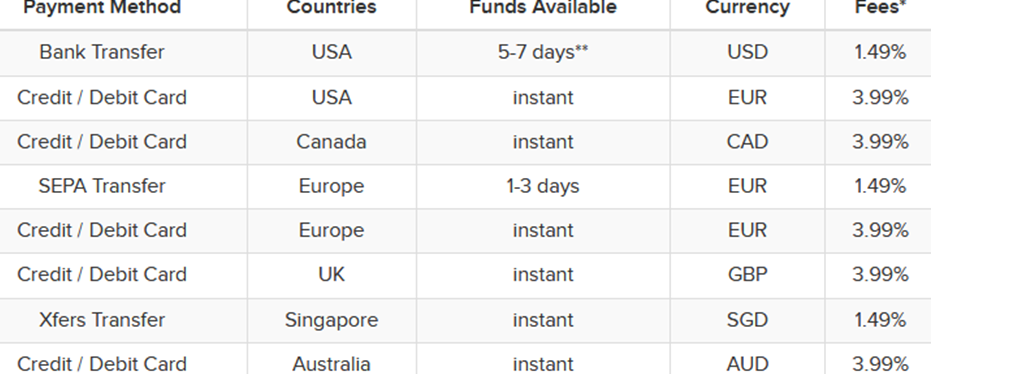
Tip: If you want to reduce your Coinbase fees, use CoinbasePro to get your coins to a cold wallet; is is cheaper. Also, you may consider Coinbase bundle offer; rather than pay a single transaction fee, you will pay the same fee for all assets contained in a bundle.
Please take some time to read our article on Coinbase Review on this page.
Verification requirements and levels
Both Kraken and Coinbase feature different verification requirements. The limits you get will depend on your level of verification and location.
Kraken features a tiered verification structure. With more verification; you get a higher tier account. Here is the breakdown:
- Tier o – At level zero you just need to verify your email address.
- Tier 1 – You have to provide Kraken with your full name, country, date of birth, and mobile number.
- Tier 2 – Submit your physical address to advance to this level.
- Tier 3 – Requires you submit a proof of residence document, such as an utility Bill.
- Tier 4 – You have to avail a signed Kraken form plus your KYC documents.
At Coinbase, verification steps are a must. You get a different account level, depending on the type of information you have verified:
- Level 1 account. You just need to verify your email and phone number.
- Level 2 account that gives up to $25,000 per day. You have to verify your personal information.
- Level 3 account for blockchain transactions. You have to verify your Identity.
Kraken VS. Coinbase: Coins listed
|
Coins listed on Kraken |
Coins listed on Coinbase |
|
Bitcoin |
Bitcoin |
|
Ether |
Ethereum |
|
Litecoin |
|
|
Gnosis |
Bitcoin Cash |
|
Litecoin |
Ethereum Classic |
|
Augur |
0r (ZRX) |
|
Melon |
USD Coin |
|
EOS |
Basic Attention Token |
|
QTUM |
Zcash |
|
Bitcoin Cash |
|
|
Cardano |
|
|
Ripple |
|
|
Monero |
|
|
Dash |
|
|
Stellar |
|
|
Zcash |
|
|
Iconomi |
|
|
Dogecoin |
Coinbase is in the process of incorporating more cryptocurrencies. There is a rumor that they have already vetted some coins. So, if you are looking to trade in many cryptocurrencies – Kraken is your ultimate choice.
Deposit and withdrawal limits
Kraken Limits
Kraken features different limits for the various payments methods they offer: deposits, withdrawals, margin trading, Wire transfer U.S. Citizens, and “High Limit USD Funding”.
For Fiat and cryptocurrency deposits and withdrawals, the limits are as explained:
- Tier 1 : Deposits and withdrawals are free. As for Cryptocurrency, deposits are unlimited while withdrawals have a limit of $2.5k and $20k for daily and monthly limits respectively.
- Tier 2: Deposits and withdrawals are capped at $2k daily, and $10k monthly -- for fiat currencies. Cryptocurrency deposits are unlimited while the limit for daily and monthly is $5k and $50k, respectively.
- Tier 3: Deposit are $25k and withdrawals are $200K. Cryptocurrency deposits are unlimited while the daily and monthly limits are $50k and $200k, respectively.
- Tier 4: Daily deposits and withdrawals are $100K; monthly limits are over $500k. Tier 4 grants you unlimited deposits for crypto coins, and over 500k for withdrawals.
USD Limit (Wire transfers for U.S. customers)
If you are have a verified U.S account, you can access different limits for wire transfers; but only if you in Tier 3 and above. See the screenshot below:
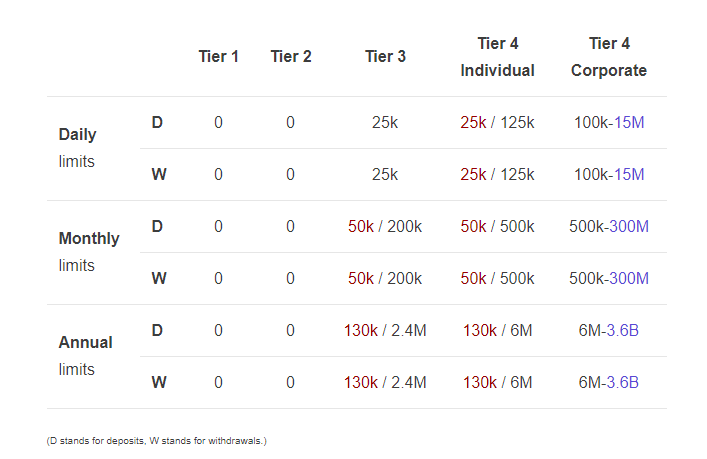
High Limit USD Funding
For Select Tier 4 account holders (both individual and corporations), they can opt for High Limit USD Funding. This option is for people moving large sums of money; a minimum of $50k. Also note that it the service is open to U.S. citizens and some specific countries.
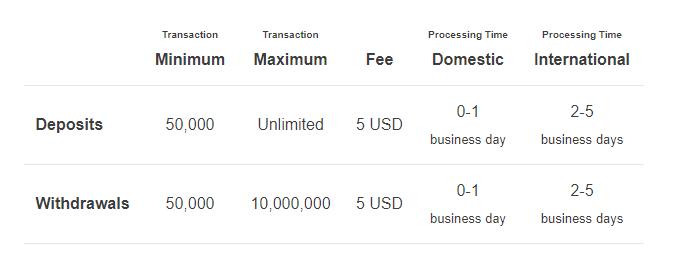
Margin borrowing limits
At Kraken, you can borrow funds (margin borrowing) to open a trading position that is higher than your account balance. You can borrow funds up to eight cryptocurrencies, and two fiat currencies -- USD and EUR.
The margin borrow limits look like this:
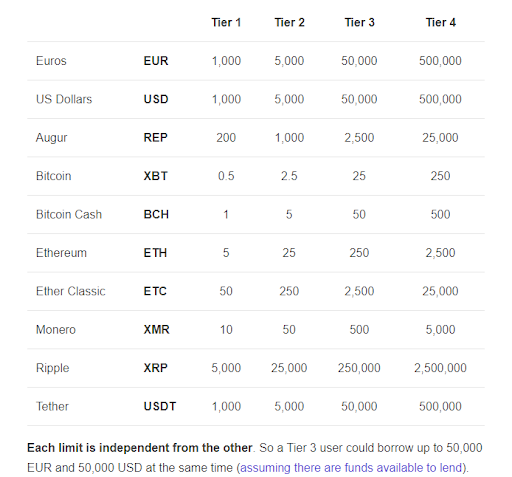
Coinbase Limits
At Coinbase, your trading limits depend on:
- The age of your account
- Your trading history
- Your location
- The payment method
The purchase limits for different payment methods look like this:
- Bank transfer: $25k per day (ACH).
- Debits Cards: Up to $7,500 per week.
- Wire transfer: Unlimited deposits and withdrawals.
Trading volume
Kraken
Kraken’s trading volume has been steadily rising. Covering a period of time, the trading volume has been marked by both highs and lows. Looking at data for the past six months – between August 2018 and January 2019 – Kraken has traded around 2M in BTC. With USD, EUR and CAD gobbling the biggest share of the value traded. As of 12th February 2019, Kraken had a 24-hour trading volume of $57, 868, 335 equivalent of 15, 934 Bitcoins traded -- according to Coinmarketcap.com.
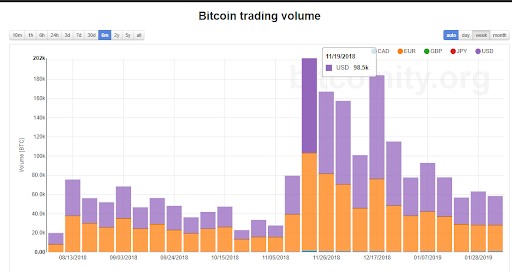
Coinbase
Coinbase trading volume is also characterized by highs and lows. Over the same six-month period, Coinbase trading volume is hovering a little above $2M – just like Kraken. USD take most of the trades (about 95%), followed closely by EUR trades. As of February 12th 2019, Coinbase:
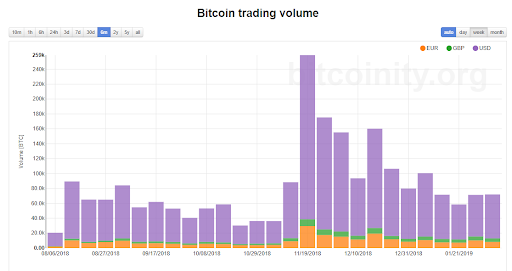
Countries supported
Kraken is available globally. However, the platform uses only two languages: English and Japanese.
Coinbase serves 32 countries: Mainly from the Anglo-sphere and Europe. Other than that, Coinbase is available in one country in Asia: Singapore. Here are the countries Coinbase serves: Austria, Belgium, Bulgaria, Canada, Croatia, Cyprus, Czech Republic, Denmark, Finland, France, Greece, Hungary, Ireland, Italy, Latvia, Liechtenstein, Malta, Monaco, Netherlands, Norway, Poland, Portugal, Romania, San Marino, Singapore, Slovakia, Slovenia, Spain, Sweden, Switzerland, United Kingdom and the United States.
Customer support review
Kraken
The customer support at Kraken is alright. It would say it has level up to the industry standards; however, it still needs improvements. You can contact Kraken two ways: by submitting a support ticket or engaging them via a live support system (available 24/7). Unfortunately, there is no way to reach them via a phone. Some people will never feel completely safe until Kraken and other Exchanges alike can provide a real phone number. Every reputable business has one.
Nonetheless, when you submit a ticket, Kraken will get back to you in good time, although sometimes the team may take weeks to resolve your issue. But then again, the customer influx is so massive, the environment is getting harder to operate in by day.
Coinbase
As for Coinbase, the support is totally displeasing. They rarely resolve an issue timely, and most of the time you will get an automated response. Even when you get a response from a real person, there is no guarantee they will address your issue.
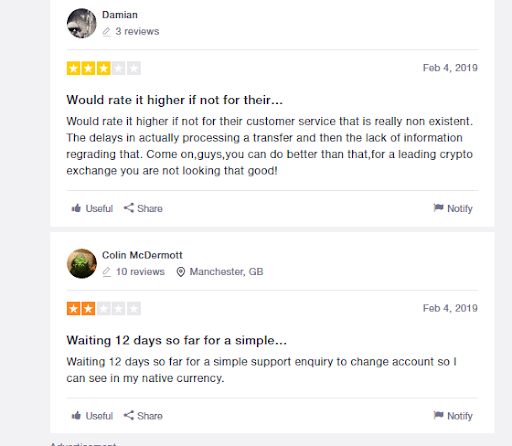
Although Coinbase is lagging behind when it come to customer support responsiveness at least it has provided a phone support ( +1 (888) 908–7930). But don’t let it get to your head, the support does not always answer calls. The other way to get in touch with Coinbase is through email. Then there is the live chat system; ask Coinbase bot anything regarding their service, it will answer some of your questions.
Coinbase VS. Kraken: Pros and Cons
Coinbase Pros
- It is straightforward to buy digital coins.
- Website and app is beginner friendly.
- Buy digital assets using credit/debit cards.
- Up to limits of $25k/day.
- Digital currencies are covered an insurance policy
- Funds are secured using cold storages
- Fiat currencies is held in custodial reserves and treasuries.
- The Coinbase Bug Bounty helps to keep security in check.
- The company complies with AML and KYC laws.
Cons
- Fees are high compared to other crypto exchanges.
- Deposits and withdrawals take a lot of time.
- Account freezing and/or disabling withdrawals.
- Coinbase has access to your private keys.
- Coinbase serves customers only in particular countries.
- Poor customer support.
Kraken Pros
- Kraken has tight security measures.
- Trading fees are pocket-friendly.
- Globally available.
- Offer a variety of altcoins and fiat currencies.
- Offers margin trading.
- Mitigate losses using the stop loss order functionality.
- Website interface design is terrific.
- Best alternative for fiat to crypto buys (particularly if you are in SEPA zone).
Cons
- No phone customer support.
- Not suitable for newbies.
- Slow verification process.
- Trading interface needs improvement (remove bugs) to enhance traders experience.
- Support ticket response is slow sometimes.
- No debit card purchases.
- Kraken has experienced website downtimes.
- Scaling Challenges.
Final thoughts
Hopefully, you have enjoyed our Kraken vs. Coinbase review article. More importantly, I genuinely hope you can make an informed decision regarding which between the two exchanges to pick. Your choice will all come down to needs/preferences.
As a caution, do keep more money on an online Exchange than you are willing to lose. That because: your funds are not safe as long as they are in the hands of someone else. Even if an exchange guarantees superior security, you can be certain how safe your money is since you don’t have full control. Share this article with your friends if you enjoyed the read.
Additional Resources:
Published: 02/28/2019

